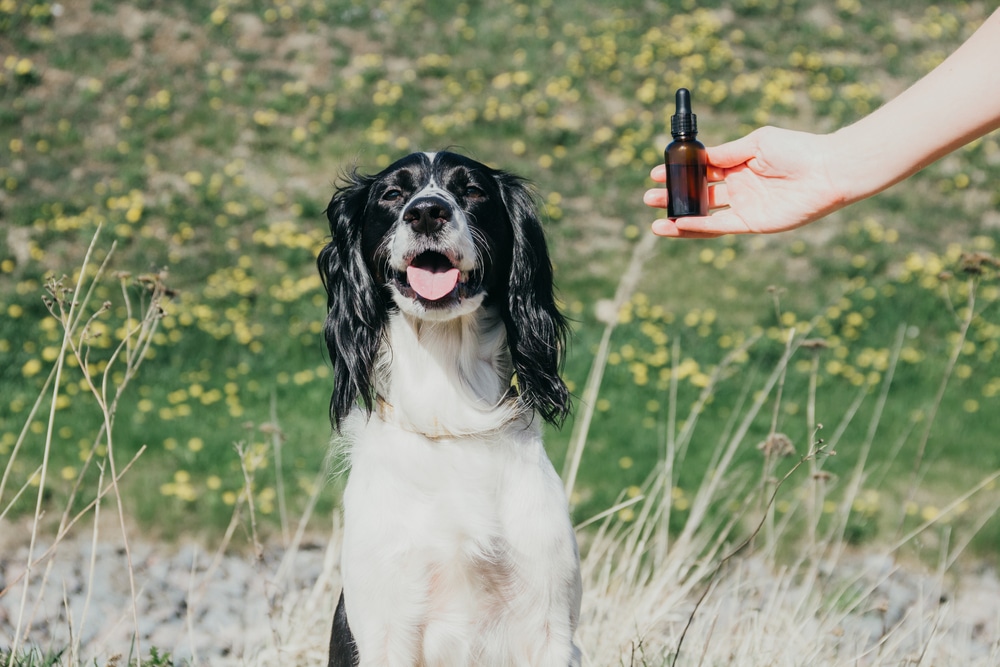Essential oils smell great and have been shown to provide many amazing health benefits for humans. They can also be found in many everyday products that we use. But not all human products are suitable for dogs, and many can cause serious health problems. So, are essential oils toxic to dogs?
Certain essential oils are toxic to dogs when ingested, inhaled, or applied to the skin. Others do not produce toxicity but can cause unpleasant side effects when consumed in large amounts. Some products containing essential oils are considered safe for pets because the amount of actual oil in them is usually very low. Unless otherwise stated, essential oils should be kept away from your pet.
Table of Contents
What Are Essential Oils?
Essential oils are concentrated plant oils extracted using steam distillation or other processes such as solvent extraction, resin tapping, and cold pressing. They contain the essence or specific fragrance of the plant from which it was derived. They are often used in alternative medicine and aromatherapy and as an aromatic in certain foods, perfume, candles, soaps, etc.
The oil itself is usually extremely bitter and concentrated. Ingesting it or applying it on the skin directly can cause irritation. It can even become toxic if your dog is exposed to enough of it. Because dogs are a lot smaller than humans, and the chemistry of their bodies is sometimes a little bit different, products that are harmless to us can be extremely dangerous for them.
List Of Toxic Essential Oils

Certain essential oils have been identified as being toxic to dogs when inhaled, ingested, or applied to their skin. Pet poison control centers have identified these as some of the most common culprits.
Pine
Pine oils come from the Scots Pine found in Europe. They are useful as a natural disinfectant and deodorizer, making them a popular additive to household cleaning products and massage oils. Pine oils are said to improve circulation and reduce tissue swelling, joint and muscle pain. But they can cause irritation when applied directly onto a dog’s skin. When ingested, they can cause drooling, weakness, abnormal gait, and vomiting that may be bloody. It also affects the nervous system, liver, and kidneys.
Pennyroyal
Also known as Squaw mint, the oils from this plant are commonly used as an insect repellent. Many unsuspecting owners use it to treat or prevent flea infestations. However, ingestion of the oil can lead to liver and kidney injury or failure in dogs. Clinical signs include diarrhea and vomiting that may be bloody, lethargy, and even death due to severe direct damage to the liver tissue.
Wintergreen
Wintergreen oil is extracted from the leaves of the Eastern Teaberry plant and is used to reduce acne and inflammation and as a topical pain reliever because it contains methyl salicylate, the same stuff found in aspirin. Aspirin, as we know, can cause gastric ulceration with bloody vomiting and kidney and liver failure in dogs that ingest too much of it. Many ointments and gels used to reduce muscle soreness and joint pains may contain wintergreen. It is also found in minty candies or baked confections.
Tea Tree (Melaleuca)
Originating from the leaves of the Australian tea bush, tea tree or melaleuca oil is arguably the most popular essential oil on this list. This also makes it the most common offender in cases of toxicity to dogs. It has garnered huge interest due to its antibacterial and anti-inflammatory properties and is found in a wide range of household, cosmetic, and medical products. Certain veterinary preparations also contain very small amounts of tea tree extract to provide the same benefits.
The toxic effects, however, are only seen when the oil is used in a very concentrated or undiluted form. Many well-intentioned owners apply a few drops of tea tree oil to help with their pet’s recurrent skin or ear infections. Unfortunately, even if your dog isn’t able to reach the spot to ingest it, its skin will absorb the oil very well, which can produce signs of toxicity such as contact irritation, depression, abnormal gait, rear leg paralysis, vomiting, and low body temperature.
Other Oils That Can Cause Toxicity In Dogs
Here’s the list:
- Cinnamon
- Citrus (d-limonene)
- Sweet birch
- Peppermint
- Ylang ylang
- Anise
- Clove
- Thyme
- Juniper
- Yarrow
That being said, there are many oils out there that haven’t yet been tested for their safety for use on dogs. As a rule of thumb, it is best to avoid any products or chemicals that aren’t formulated specifically for dogs unless you’re directed to do so by your veterinarian.
How Can A Dog Become Exposed To Essential Oils?
Essential oils are rapidly absorbed through the stomach, skin, and lungs. The most common way for dogs to become exposed to toxic amounts of essential oils is when the oil is applied directly on the skin or ingested. Depending on the concentration, even a few drops of the oil can be potent enough to cause serious harm to pets. Concentrated oils should never be used directly on your pet.
Unfortunately, essential oils are not regulated by the FDA, meaning that just about anyone can create and market products that contain them. Some formulations that are meant for skin therapy or tick and flea prevention can contain toxic amounts of essential oils. It is important to vet the manufacturers of any item that we buy for our pets, especially if they are used without a veterinarian’s recommendation. We recommend consulting with your vet prior to any new product use with regards to your pets though.
Inhalation exposure is another way by which our pets become exposed to essential oils. Active diffusers such as nebulizers or ultrasonic diffusers produce microdroplets that contain the oil. Dogs may inhale these droplets, or the oils may collect on their fur or skin. They may be absorbed directly or ingested as your pet licks themselves. Even if they don’t become toxic from that, diffusers or even candles that produce strong smells can cause irritation to the sensitive membranes around your dog’s nose and eyes. This leads to an uncomfortable burning sensation, coughing, nausea that causes drooling or vomiting, and asthma.
What To Do If Your Dog Becomes Exposed To Essential Oils?
If your dog does become exposed and begins showing any of the signs mentioned above, do not wait! Early intervention will reduce the amount of oil that gets absorbed into the system.
The first priority is to remove the source of the exposure. Immediately remove any medicated flea collars that your pet may be wearing, and wash off the skin where any oil or product was applied using gentle soap and lots of running water.
If you suspect your pet has ingested the oil, get on the phone with your veterinarian or a pet poison control center (you should contact them regardless though, especially if you’re noticing symptoms). Depending on the situation, they may be able to guide you to induce vomiting at home before you bring your pet in for evaluation. Time is of the essence here (no pun intended!), and being prepared to act swiftly may save your pet’s life.
Here’s some important contact information that is good to have handy if you have a pet:
- Pet Poison Helpline (US, Canada, Caribbean): 1 (855) 764-7661 1 (855) 764-7661
- ASPCA Animal Poison Control (USA): (888) 426-4435 (according to their website, a consultation fee may apply)
- Pet Poison Helpline (UK): 800-213-6680
- Animal PoisonLine (UK): 0800 731 2502
Conclusion: Natural Isn’t Always Safe
Just because something is sold as a natural, holistic alternative to medical treatment doesn’t always make it safe, especially when products meant for humans are used on pets. Our furry companions are often a lot smaller, and their bodies process things a little bit differently from ours. Not enough research has been conducted yet to test whether alternative treatments work the same way in animals as they do in humans, putting our pets at risk of unexpected and unpleasant consequences.
When it comes to essential oil toxicity, prevention is always better than a cure. Avoid the use of any pure oils or concentrated products on your pet without first consulting your veterinarian, and beware of unregulated “natural” products on the market that may end up being harmful.
So, what do you plan to do with this information? Let us know in the comments below!
